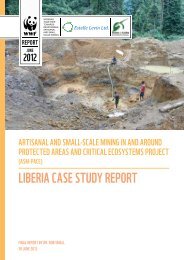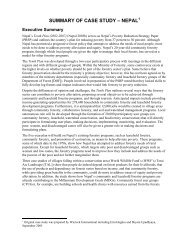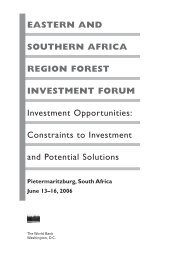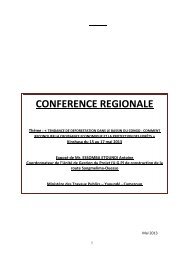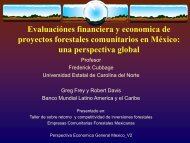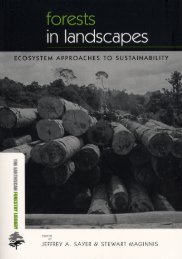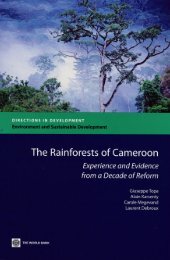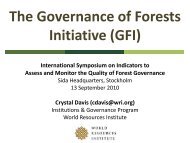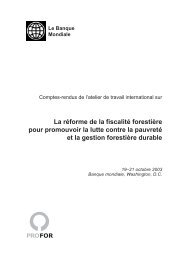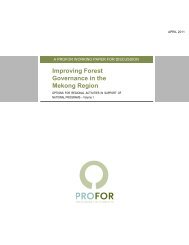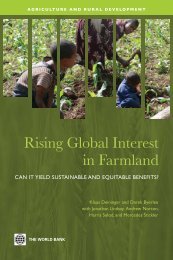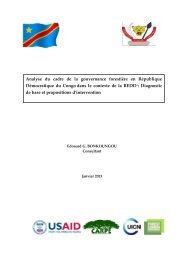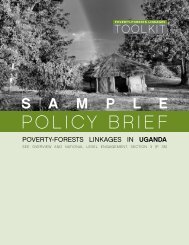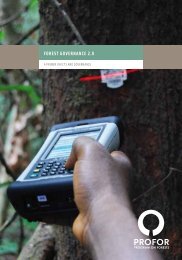INVESTING IN TREES AND LANDSCAPE ... - PROFOR
INVESTING IN TREES AND LANDSCAPE ... - PROFOR
INVESTING IN TREES AND LANDSCAPE ... - PROFOR
You also want an ePaper? Increase the reach of your titles
YUMPU automatically turns print PDFs into web optimized ePapers that Google loves.
issues should be dealt with before the investor is on the scene. Once the hard investor arrives,<br />
the community needs to confirm that an appropriate process was followed and that this entity<br />
can make enforceable deals. Otherwise, the investor faces a future risk of disagreement over the<br />
terms of the deal and “submarine” claims (emerging after an intentional delay) regarding land and<br />
resources. The agreement could include a statement to the effect that the investor has evidence<br />
that the constitution and ownership of the company is a proper reflection of the will of the broader<br />
community, but it is hard to see how this could be ascertained by an investor in practice.<br />
It thus makes sense to widen the definition of this principle to include participation in designing<br />
the enterprise, and to create articles of association that define rules and procedures that balance<br />
the rights of shareholders with the need for company officers to make effective business decisions<br />
that are in the long-term interests of the company and all its shareholders, such as replacing a<br />
nonperforming executive. Such a structure should be careful not to discriminate between different<br />
classes of shareholders if that means diminishing the autonomy of the local rights-holders (e.g.,<br />
voting and nonvoting shares, preferred stock).<br />
Understanding rights and obligations, and committing to local control<br />
Where there is no clear legal tenure, it can be said that the land is not “locally controlled” and<br />
thus investment in local forest or landscape enterprises is not possible. It could be argued that<br />
tenure is the fundamental necessary condition for investment. Yet rights-holders often believe that<br />
involvement with an investor might lead to clarification of tenure; indeed, this outcome could be<br />
more important to them than direct financial rewards. How would this happen in practice? Perhaps<br />
an investor has more influence with the national or local government? Not all such deals end happily.<br />
The palm oil estates in Indonesia endow each of the outgrowers with a 2-hectare plot of land, but<br />
in many cases this arrangement has proved to be less valuable than the previous arrangement of<br />
communal access to a very large area of forest. So formal tenure may be a retrograde step from<br />
the status quo.<br />
As part of the process of securing long-term tenure security, rights-holders may need to be prepared<br />
to work with the government to encapsulate their rights into an existing legal framework (for instance,<br />
a concession or lease) that permits fair use of the resource, even if this does not in the short-term<br />
advance their ultimate goal of freehold tenure (Elson 2010). Some compromise might be required<br />
by local rights-holders to allow investment to proceed, with the stated long-term goal of obtaining<br />
more permanent formal tenure in the future. The consensus among rights-holder groups is that<br />
recognizing and securing land tenure and user rights is a precondition for sustainable forest and<br />
land management. Rights are thus a precondition for rural development, as tenure is an asset and<br />
releases the value locked up in land and forests. However, governments often need to be convinced<br />
that there is no loss to the state by transferring state forest land to local people—this misconception<br />
stands in the way of tenure reform in many countries.<br />
Clarity of tenure is of interest to all parties in the deal, but their interests vary in subtle ways.<br />
Rights-holders might have various ideas about how tenure maps onto their usually quite sophisticated<br />
understanding of multiple overlapping layers of state-defined and customary practice ownership,<br />
management, and use rights. Tenure can be tied to issues of self-determination or intracommunity<br />
politics, and can often have a complicated legacy.<br />
Chapter 3. OPPORTUNITIES <strong>AND</strong> CONSTRA<strong>IN</strong>TS FOR <strong><strong>IN</strong>VEST<strong>IN</strong>G</strong> <strong>IN</strong> FORESTS <strong>AND</strong> <strong>TREES</strong> <strong>IN</strong> L<strong>AND</strong>SCAPES<br />
85



